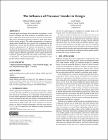| dc.contributor.author | Vogel, Carl | |
| dc.contributor.author | Ribeiro Lopes, Milena | |
| dc.date.accessioned | 2021-09-16T14:20:00Z | |
| dc.date.available | 2021-09-16T14:20:00Z | |
| dc.date.created | July 2021 | en |
| dc.date.issued | 2021 | |
| dc.date.submitted | 2021 | en |
| dc.identifier.citation | Ribeiro Lopes, M. and Vogel, C., The Influence of Personas' Gender in Design, CHItaly 2021: 14th Biannual Conference of the Italian SIGCHI Chapter, July 2021, 2021, 1-8 | en |
| dc.identifier.other | Y | |
| dc.identifier.uri | http://hdl.handle.net/2262/97086 | |
| dc.description | PUBLISHED | en |
| dc.description.abstract | In mobile application design, the construction of personas is a well-known technique that helps designers to empathise with users and to understand their needs. However, there are several issues that lead to stereotyped personas and men’s needs being prioritised in design projects. The under-representation of women in design teams, insufficient user research, the assumption that the default user is a man, and the influence of personal beliefs in the decision making process all obstruct the inclusion of women’s needs in the design process. Therefore, we propose the creation of gender-neutral personas that merge both the needs of men and women using two different approaches, and we compare them with
traditional gendered personas. The results of the study confirm our hypothesis — the gender-neutral personas culminated in more gender-inclusive design requirements. | en |
| dc.format.extent | 1-8 | en |
| dc.language.iso | en | en |
| dc.rights | Y | en |
| dc.subject | Gender-neutral persona | en |
| dc.subject | Gender-inclusive design | en |
| dc.subject | Mobile app development | en |
| dc.title | The Influence of Personas' Gender in Design | en |
| dc.title.alternative | CHItaly 2021: 14th Biannual Conference of the Italian SIGCHI Chapter | en |
| dc.type | Conference Paper | en |
| dc.type.supercollection | scholarly_publications | en |
| dc.type.supercollection | refereed_publications | en |
| dc.identifier.peoplefinderurl | http://people.tcd.ie/vogel | |
| dc.identifier.rssinternalid | 233439 | |
| dc.identifier.doi | https://doi.org/10.1145/3464385.3464736 | |
| dc.rights.ecaccessrights | openAccess | |
| dc.subject.TCDTheme | Creative Technologies | en |
| dc.subject.TCDTheme | Digital Engagement | en |
| dc.subject.TCDTheme | Digital Humanities | en |
| dc.subject.TCDTag | Computational Linguistics | en |
| dc.subject.TCDTag | Computational linguistics | en |
| dc.subject.TCDTag | Digital Humanities | en |
| dc.subject.TCDTag | GENDER | en |
| dc.subject.TCDTag | Gender role attitudes | en |
| dc.subject.TCDTag | Gender role attitudes & behaviour | en |
| dc.subject.TCDTag | computational linguistics | en |
| dc.subject.TCDTag | gender bias | en |
| dc.identifier.rssuri | https://dl.acm.org/doi/10.1145/3464385.3464736 | |
| dc.identifier.orcid_id | 0000-0001-8928-8546 | |
| dc.subject.darat_thematic | Gender | en |
| dc.status.accessible | N | en |
| dc.contributor.sponsor | Science Foundation Ireland (SFI) | en |
| dc.contributor.sponsorGrantNumber | 13/RC/2106 | en |
| dc.contributor.sponsor | Science Foundation Ireland (SFI) | en |
| dc.contributor.sponsorGrantNumber | 12/CE/I2267 | en |




